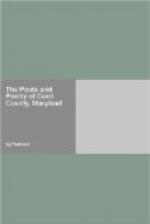He is among the very best classical and literary scholars that his native county has produced. Mr. Cruikshank studied law for about a year in the office of Charles J.M. Gwinn, of Baltimore, but was compelled by the threatened loss of sight to relinquish study until 1865, when he completed the prescribed course of reading in the office of Colonel John C. Groome, in Elkton, and was admitted to the Elkton Bar on September 18th, 1865, and on the same day purchased an interest in The Cecil Democrat, and became its editor, a position he still continues to fill.
In 1883 Mr. Cruikshank became connected with the Baltimore Day, which he edited while that journal existed.
Mr. Cruikshank, in 1869, married his cousin Sarah
Elizabeth Cruikshank.
They are the parents of five children—three
of whom survive.
Mr. Cruikshank is one of the most forcible and brilliant editorial writers in the State, and the author of a number of chaste and erudite poems written in early manhood, only two or three of which have been published.
STONEWALL JACKSON.
[1863.]
AN IMPROMPTU ON HEARING OF HIS DEATH.
Bury the mighty dead—
Long, long to live in story!
Bury the mighty dead
In his own shroud of glory.
Question not his purpose;
Sully not his name,
Nor think that adventitious aid
Can build or blight his fame,
Nor hope, by obloquizing what
He strove for, glory’s laws
Can be gainsaid, or he defiled
Who’d honor any cause.
Question not his motives,
Ye who have felt his might!
Who doubts, that ever saw him strike,
He aimed to strike for right?
His was no base ambition;—
No angry thirst for blood.
Naught could avail to lift his arm,
But love of common good.
Yet, when he deigned to raise it,
Who could resist its power?
Or who shall hope, or friend, or foe,
E’er to forget that hour?
His life he held as nothing.
His country claimed his all.
Ah! what shall dry that country’s tears
Fast falling o’er his fall?
His life he held as nothing,
As through the flame he trod;
To duty gave he all of earth
And all beyond to God.
The justness of his effort
He never lent to doubt.
His aim, his arm, his all was fix’d
To put the foe to rout.
Mistrusting earth’s tribunals,
Scorning the tyrant’s rod,
He chose the fittest Arbiter,
’Twixt foe and sword, his God.
And doubted not, a moment,
That, when the fight was won,
Who rules the fate of nations
Would bid His own:—Well done!
And doubted not, a moment,
As fiercest flashed the fire,
The bullet’s fatal blast would call:—
Glad summons!—Come up higher!
And who would hence recall thee?—
Thy work so nobly done!
Enough for mortal brow to wear
The crown thy prowess won:—
Grim warrior, grand in battle!
Rapt christian, meek in prayer!—
Vain age! that fain would reproduce
A character as rare!




